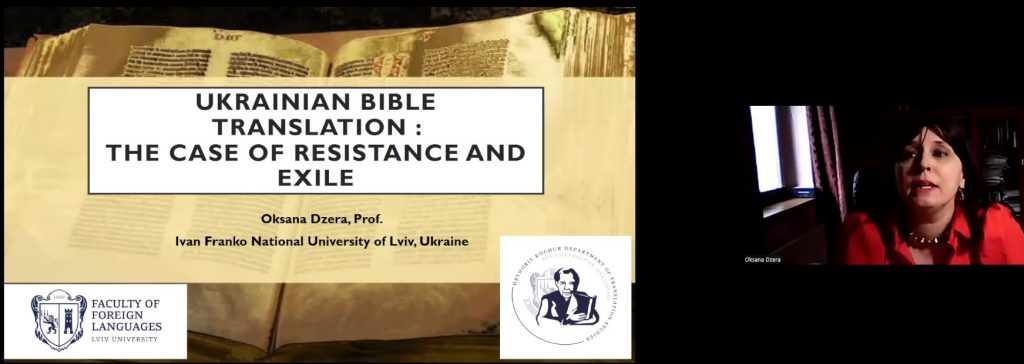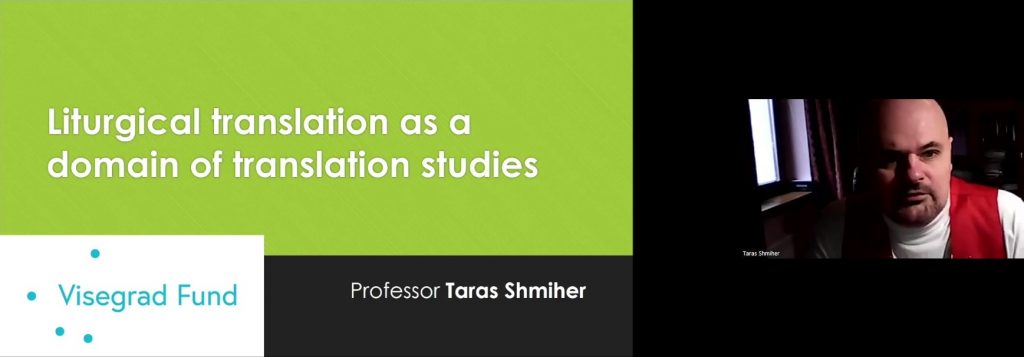Abstracts:
Talk 1: Ukrainian Bible Translation: The Case of Resistance and Exile, by Professor Oksana Dzera
The research project aims to reconsider and revisit the role of the Bible translations in establishing and determining Ukrainian religious and cultural spaces in the circumstances of Russian colonization. Since the sacred and authoritative status of a text imparts prestige and recognition to languages it is translated into, the activism of Ukrainian translators of the Bible in the 1860s-1900s was bound to trigger official bans on Ukrainian cultural products. Destructive gatekeeping policies applied by the state and the Russian Orthodox Church, working in tandem, displaced the production and distribution of Ukrainian Bible translations behind the borders of the Russian empire of the tsarist and soviet models. Three full Ukrainian translations of the Holy Scripture, namely the translation completed by Kulish, Pului and Levytskyi in 1903 and two nearly simultaneous translations done in early 1960s by Ivan Ohiyenko, the metropolitan of the Ukrainian Autocephalous Church in exile, and Ivan Khomenko, a priest of the Greek-Catholic Church in exile, were published outside Ukraine. Subsequently, these translations, as well as a number of other translations of the Gospels and the Psalter, remained inaccessible for believers of soviet Ukraine and failed to “to be awoken” through its reading and interpretation. This silence surrounding Ukrainian Bible translations and gaps in their reception by the targeted receiver reflect the translation policy in the colonial religious and cultural contexts.
The research highlights the resistance strategy actualized in Ukrainian Bible translations overtly through defiant paratexts and covertly via the lingual intervention targeted at promoting Ukrainian lexical resources, which fell victim to the repressive measures of imperial linguocide. Likewise, Ukrainian translators of fine literature, who represented so call baroque trend, subtly interspersed their outputs with phrases borrowed from Kulish’s translation of the Bible. This subtle translation technique of lingual intervention became an ingeniously instrumental tool for cultural liberation under the circumstances of the russification policy targeted at marginalizing authentic Ukrainian words and annihilating the linguistic identity of the Ukrainian nation. In the broad sense the Holy Bible remained the most widely translated book in Ukraine, as the Ukrainian literature abounds in implicit and explicit attempts “to translate” Biblical images, Biblical wisdom or even phrases deducible to the sacred text.
Talk 2: Liturgical Translation as a Domain of Translation Studies, by Dr Taras Shmiher
Liturgical translation received much less attention than biblical translation. This status was defined by its origin: liturgical texts are mostly secondary to biblical prototexts, their phrasing and symbols. Although liturgical books have always been venerated with great piety, their presence and visibility in national cultures were influenced by churchly regulations on the use of languages, dynamic features of book-writing and book-printing, nation-shaping and state-building challenges. The progress in envisaging religious translation as a special domain of translation research stimulated to widen this domain by specifically addressing to liturgical texts. In general, it makes sense to divide religious translation into three branches: biblical translation (or the translation of sacred texts of the highest authority due to a great amount of existing literature), liturgical translation (covering the lingual, cultural and societal issues of poetics and reception) and catechetic translation (sharing a lot of theoretical issues with sci-tech translation.
The report deals with theoretical principles and ideas which are fundamental for liturgical translation and essential for the comparative studies of liturgical traditions. It starts with the general idea of comparison in research and the possibilities of its applying for exploring specific dimensions of religious histories and texts from the viewpoint of translation. The theoretical parameters for assessing a liturgical text come from the possibility of identifying the components of equivalence, understanding pitfalls of the status of languages and appreciating the appropriation of paratextual features in liturgical praxis.
About the Speakers:
Oksana Dzera is Doctor Habilitated and Head of the Hryhoriy Kochur Department of Translation Studies and Contrastive Linguistics of Ivan Franko National University of Lviv, Ukraine. She lectures in Translation Theory, Contrastive Lexicography, Genre Theories of Translation, Strategies and Traditions of Bible Translation. Her research interests are intertextuality and translation, history of literary translation in Ukraine, reception of the Ukrainian literature in the Anglophone world, contrastive Bible phraseology and phraseography. She is the author of Bible Intertextuality and Translation: English and Ukrainian Context (489 p., 2017) and English and Ukrainian Lexicography (a concise theory and history) (169 p., 2004).
Taras Shmiher is Doctor Habilitatus and Professor at the Ivan Franko National University of Lviv, Ukraine. He researches and publishes in the history and theory of translation, translation quality assessment, and early Ukrainian texts. Shmiher authored several books, like A History of Twentieth-Century Ukrainian Translation Studies (2009), Translation Quality Assessment, Its Theoretical and Applied Aspects: Early Ukrainian Literature As Translated into Contemporary Ukrainian and English (2018), A History of Ukrainian Translation Studies (2021) and a comprehensive bibliography of twentieth-century translation studies in Ukraine in 2013.
He is laureate of the Hryhoriy Kochur Literary Prize and the full member of Shevchenko Scholarly Society (both 2015).
He was also a Fulbright scholar at the University of California, Berkeley, a visiting researcher at Prešov University (Slovakia), and a research fellow at the Maria Curie-Skłodowska University in Lublin (Poland).
His main but not limited to research interests are translation studies, medieval literature, liturgical translation, reception and perception.






